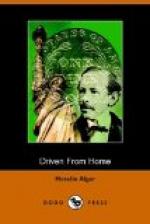“I didn’t think of that,” said Leonard, jealously.
“Living as he does with Mr. Jennings, he will naturally try to ingratiate himself with him, and stand first in his esteem.”
“That is true. Is Mr. Jennings a rich man, do you think?”
“Yes, I think he is. The factory and stock are worth considerable money, but I know he has other investments also. As one item he has over a thousand dollars in the Carterville Savings Bank. He has been very prudent, has met with no losses, and has put aside a great share of his profits every year.”
“I wonder he don’t marry.”
“Marriage doesn’t seem to be in his thoughts. Hannah makes him so comfortable that he will probably remain a bachelor to the end of his days.”
“Perhaps he will leave his money to her.”
“He is likely to live as long as she.”
“She is a good deal longer than he,” said Leonard, with a laugh.
The bookkeeper condescended to smile at this joke, though it was not very brilliant.
“Before this boy Carl came,” he resumed thoughtfully, “I hoped he might take a fancy to you. He must die some time, and, having no near blood relative, I thought he might select as heir some boy like yourself, who might grow into his favor and get on his blind side.”
“Is it too late now?” asked Leonard, eagerly.
“Perhaps not, but the appearance of this new boy on the scene makes your chance a good deal smaller.”
“I wish we could get rid of him,” said Leonard, frowning.
“The only way is to injure him in the estimation of Mr. Jennings.”
“I think I know of a way.”
“Mention it.”
“Here is an advertisement of a lottery,” said Leonard, whose plans, in view of what his uncle had said, had experienced a change.
“Well?”
“I will write to the manager in Carl’s name, inquiring about tickets, and, of course, he will answer to him, to the care of Mr. Jennings. This will lead to the suspicion that Carl is interested in such matters.”
“It is a good idea. It will open the way to a loss of confidence on the part of Mr. Jennings.”
“I will sit down at your desk and write at once.”
Three days later Mr. Jennings handed a letter to Carl after they reached home in the evening.
“A letter for you to my care,” he explained.
Carl opened it in surprise, and read as follows:
“Office Of Gift Enterprise.
“Mr. Carl Crawford:—Your letter of inquiry is received. In reply we would say that we will send you six tickets for five dollars. By disposing of them among your friends at one dollar each, you will save the cost of your own. You had better remit at once.
“Yours respectfully, Pitkins & Gamp,
“Agents.”
Carl looked the picture of astonishment when he read this letter.




